When I spoke to Dan Twomey earlier this week the last thing he said to me was that there had been a visible pull back on sowing dates across much of the south, with some growers local to him not having started yet.
This is most likely a consequence of the fact that winter barley suffered from poor performance in the county last year, plus the relatively good performance of spring barley.
At the start of this week Dan had about two-thirds of his winter barley planted. Sowing began on 3 October with KWS Joyau planted at 11 st/ac (172 kg/ha). After that he moved to plant Integral at the same seeding rate and he is now moving over to plant Tardis.
Conditions were good for most of the planting which enabled him to get about 70% of the planted area rolled. The plough moved a little ahead of the drill in the early part of the season but now the plough is not allowed to get too far ahead due to the risk of rain.
Once winter barley planting is finished the plan is to move on to plant winter oats.
Springs
He is not sure if he will get any wheat planted at this point. Dan pointed out that an amount of the land he is farming is subject to springs and when the water bursts through it generates trafficability problems and a real risk to patches in a planted crop.
The first of the winter barley has now emerged and he plans to go out with herbicide (Firebird) and aphicide from next week.
The wet weather may also see slugs becoming more of an issue but they are normally not a problem, Dan said, because of good tight seedbeds. A few of his fields can have issues and these will be watched and treated if necessary.
Beet harvesting may start next week, weather permitting, as regular customers are beginning to enquire about its availability.
It is hard to imagine that there has been harvesting done since Iain was last featured a month ago. It was in the early part of that window when he cut his Tiffany spring beans.
He was quite happy with an average yield of 2.6 t/ac at 17% moisture.
Since then, most of the winter barley has been sown. This was split between three varieties – Mountain, Hawking and Tardis.
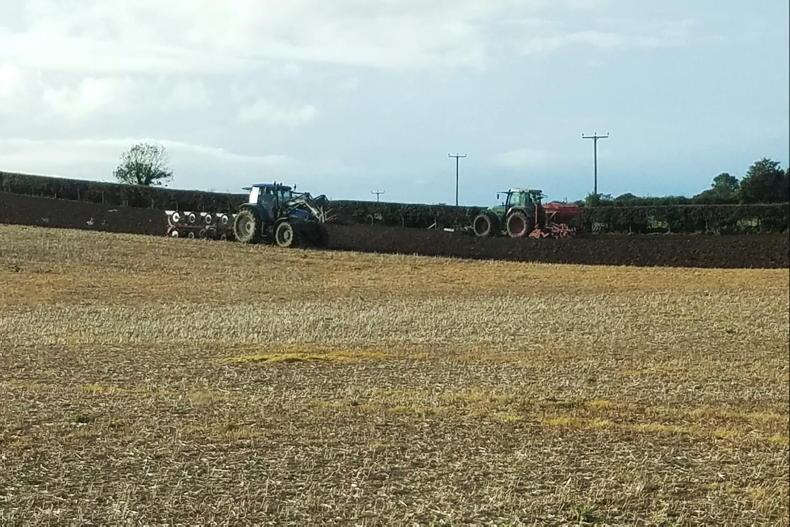
Iain McMordie sowing the last of his winter barley last weekend using the plough and one-pass, as conditions had become a bit awkward for direct drilling.
Iain finished planting his last 30ac of winter barley early this week but it was very stop/start at the end with the broken weather.
All the early planting was done by direct drilling but he had to move back to the plough and one-pass to get the last bit completed. None of his early planted barley was rolled but it was sprayed for weeds pre-emergence and is now emerging.
Most of his winter wheat was also planted in recent weeks and this too was direct drilled and rolled. The main variety sown was Extase, but Iain still has some Dawsum to plant.
Weather is now an increasing concern but, as with the barley, the plough and one-pass will most likely enable it to be done.
All his planted wheat and barley was sprayed pre-emergence with Liberator + DFF (0.4+0.1 l/ha), including the barley planted on Monday.
Liberator is similar to Firebird, but with a lower DFF inclusion.
Oilseed rape
The winter oilseed rape is growing well but there were some problems with slugs which have caused a few patches to thin out. Additional slug pellets have been applied in these areas.
Relieved that the vast majority of winter planting is already completed, Iain commented that his bigger 6m Dale direct drill has made 50 planted acres a relatively straightforward day’s work in good conditions.
This is well matched by the 12m roller which provides great ability to stay close to the drill when conditions permit.
When I spoke to Derek last Monday he was ploughing, as the area had escaped the bulk of Sunday’s rain and he was hoping to be planting again that evening.
At that point he was about 75% through winter crop planting and hopes to be almost finished this week.
Winter wheat planting began in the last week of September, as did harvesting of maincrop potatoes.
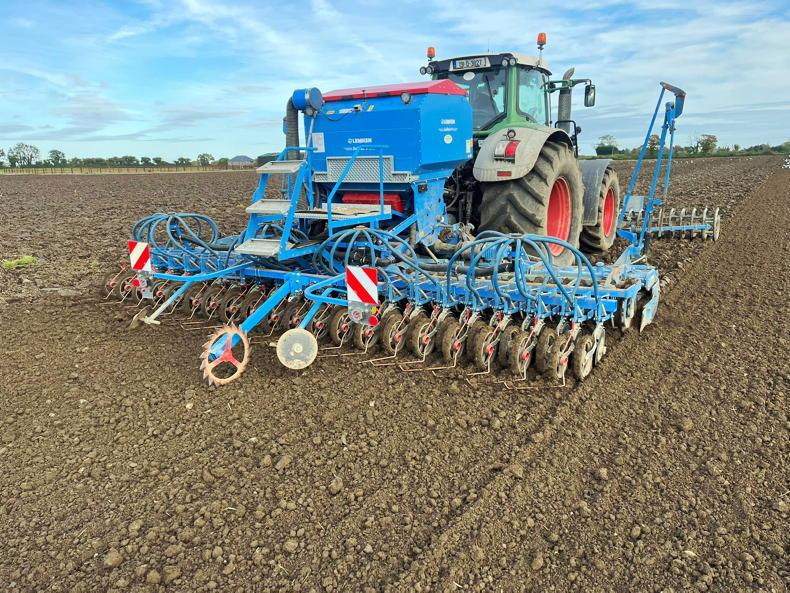
Derek really likes the disc counter system on the 6-meter mounted Solitair 9 drill.
That too continues apace and may also be finished this week if the weather remains kind. Derek described potato yields as being about average at 18-20 boxes per acre.
Quality is good, with just a little scab on a small proportion of the crop. Dry matters are high, which meant extra care during harvesting to minimise the risk of bruising.
The safer first-wheat slots were first to be planted and there was an amount of ploughing done in advance.
Then he moved into winter barley planting in the first week of October and then back to the second and continuous wheat slots as we go later into October, using Latitude dressed seed where take-all risk is highest.
The early-ploughed ground was dry at that time and so could soak up a lot of rain. That has all been sown and now the plough is working just ahead of the drill.
Winter barley
The winter barley varieties were Tardis and KWS Joyau, with a little Cassia. Derek had intended to sow Valerie, but seed was not available at the time.
Graham is his main winter wheat variety, sown mainly in first wheat slots. He also has an amount of Gleam which was dressed with Latitude for second wheat slots and this was also used as a continuous wheat.
He also has an amount of Skyscraper, plus some Dawsum in first wheat slots.
Derek is very pleased with the new mounted 6m Lemken Solitair 9 fitted with disc coulters. He feels he is getting better seed placement and coverage with these, especially now that conditions are a bit more challenging.
His oilseed rape is growing away nicely and he also managed to get an amount of hedge cutting done before planting began.
When I spoke to Dan Twomey earlier this week the last thing he said to me was that there had been a visible pull back on sowing dates across much of the south, with some growers local to him not having started yet.
This is most likely a consequence of the fact that winter barley suffered from poor performance in the county last year, plus the relatively good performance of spring barley.
At the start of this week Dan had about two-thirds of his winter barley planted. Sowing began on 3 October with KWS Joyau planted at 11 st/ac (172 kg/ha). After that he moved to plant Integral at the same seeding rate and he is now moving over to plant Tardis.
Conditions were good for most of the planting which enabled him to get about 70% of the planted area rolled. The plough moved a little ahead of the drill in the early part of the season but now the plough is not allowed to get too far ahead due to the risk of rain.
Once winter barley planting is finished the plan is to move on to plant winter oats.
Springs
He is not sure if he will get any wheat planted at this point. Dan pointed out that an amount of the land he is farming is subject to springs and when the water bursts through it generates trafficability problems and a real risk to patches in a planted crop.
The first of the winter barley has now emerged and he plans to go out with herbicide (Firebird) and aphicide from next week.
The wet weather may also see slugs becoming more of an issue but they are normally not a problem, Dan said, because of good tight seedbeds. A few of his fields can have issues and these will be watched and treated if necessary.
Beet harvesting may start next week, weather permitting, as regular customers are beginning to enquire about its availability.
It is hard to imagine that there has been harvesting done since Iain was last featured a month ago. It was in the early part of that window when he cut his Tiffany spring beans.
He was quite happy with an average yield of 2.6 t/ac at 17% moisture.
Since then, most of the winter barley has been sown. This was split between three varieties – Mountain, Hawking and Tardis.

Iain McMordie sowing the last of his winter barley last weekend using the plough and one-pass, as conditions had become a bit awkward for direct drilling.
Iain finished planting his last 30ac of winter barley early this week but it was very stop/start at the end with the broken weather.
All the early planting was done by direct drilling but he had to move back to the plough and one-pass to get the last bit completed. None of his early planted barley was rolled but it was sprayed for weeds pre-emergence and is now emerging.
Most of his winter wheat was also planted in recent weeks and this too was direct drilled and rolled. The main variety sown was Extase, but Iain still has some Dawsum to plant.
Weather is now an increasing concern but, as with the barley, the plough and one-pass will most likely enable it to be done.
All his planted wheat and barley was sprayed pre-emergence with Liberator + DFF (0.4+0.1 l/ha), including the barley planted on Monday.
Liberator is similar to Firebird, but with a lower DFF inclusion.
Oilseed rape
The winter oilseed rape is growing well but there were some problems with slugs which have caused a few patches to thin out. Additional slug pellets have been applied in these areas.
Relieved that the vast majority of winter planting is already completed, Iain commented that his bigger 6m Dale direct drill has made 50 planted acres a relatively straightforward day’s work in good conditions.
This is well matched by the 12m roller which provides great ability to stay close to the drill when conditions permit.
When I spoke to Derek last Monday he was ploughing, as the area had escaped the bulk of Sunday’s rain and he was hoping to be planting again that evening.
At that point he was about 75% through winter crop planting and hopes to be almost finished this week.
Winter wheat planting began in the last week of September, as did harvesting of maincrop potatoes.

Derek really likes the disc counter system on the 6-meter mounted Solitair 9 drill.
That too continues apace and may also be finished this week if the weather remains kind. Derek described potato yields as being about average at 18-20 boxes per acre.
Quality is good, with just a little scab on a small proportion of the crop. Dry matters are high, which meant extra care during harvesting to minimise the risk of bruising.
The safer first-wheat slots were first to be planted and there was an amount of ploughing done in advance.
Then he moved into winter barley planting in the first week of October and then back to the second and continuous wheat slots as we go later into October, using Latitude dressed seed where take-all risk is highest.
The early-ploughed ground was dry at that time and so could soak up a lot of rain. That has all been sown and now the plough is working just ahead of the drill.
Winter barley
The winter barley varieties were Tardis and KWS Joyau, with a little Cassia. Derek had intended to sow Valerie, but seed was not available at the time.
Graham is his main winter wheat variety, sown mainly in first wheat slots. He also has an amount of Gleam which was dressed with Latitude for second wheat slots and this was also used as a continuous wheat.
He also has an amount of Skyscraper, plus some Dawsum in first wheat slots.
Derek is very pleased with the new mounted 6m Lemken Solitair 9 fitted with disc coulters. He feels he is getting better seed placement and coverage with these, especially now that conditions are a bit more challenging.
His oilseed rape is growing away nicely and he also managed to get an amount of hedge cutting done before planting began.





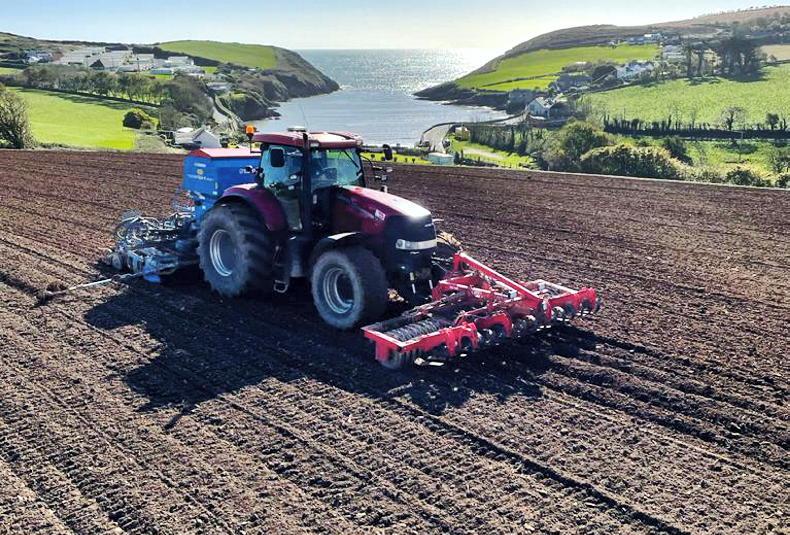

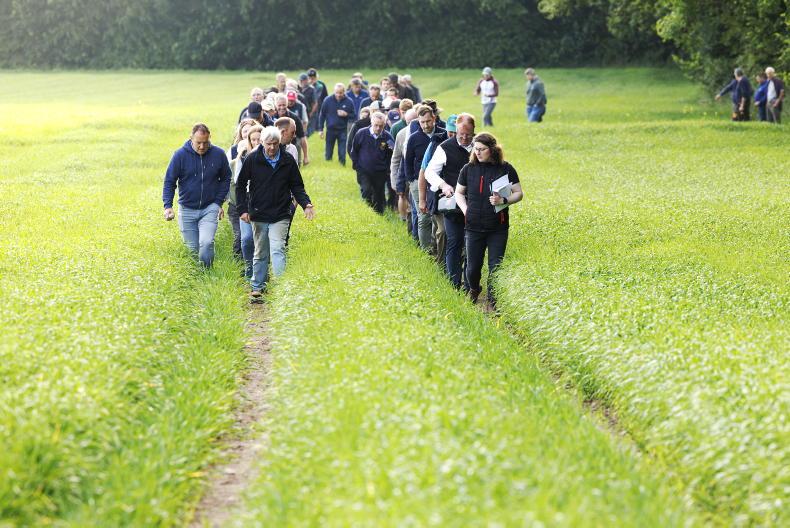

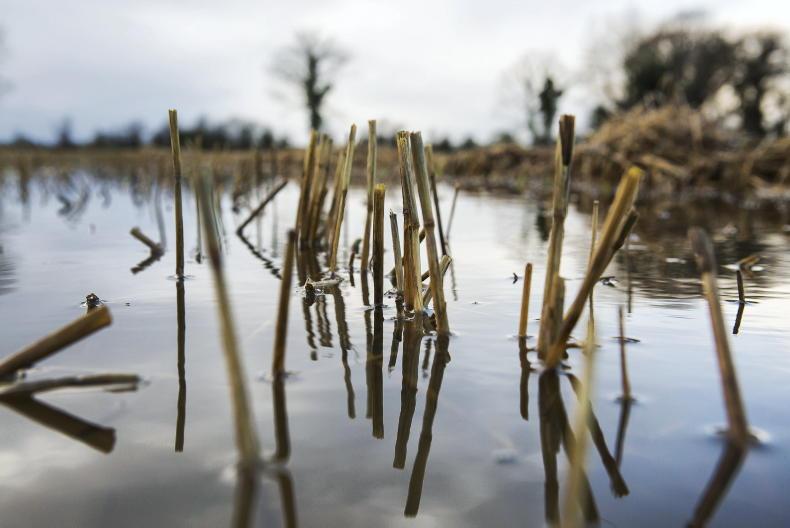
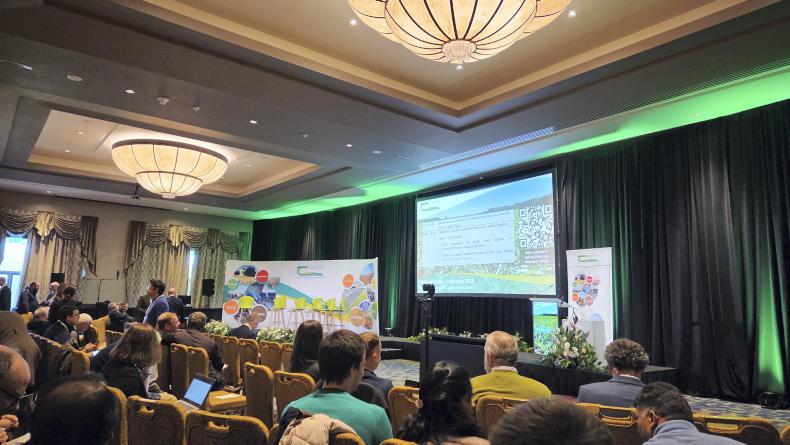
SHARING OPTIONS